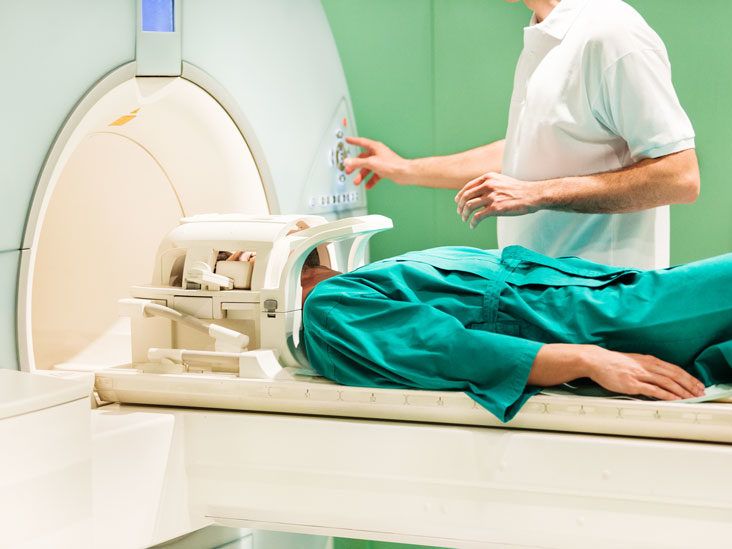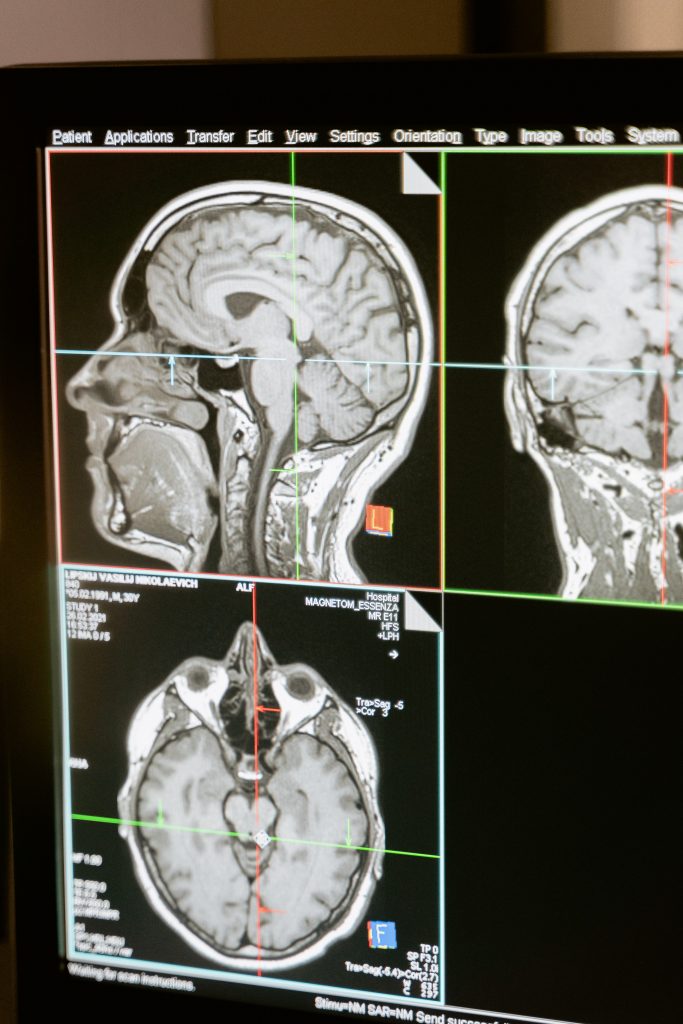Introduction
MRI scans are an essential part of modern healthcare, helping doctors diagnose a wide range of medical conditions. For MS patients, MRI’s are a regular part of program. While they offer invaluable insights, the experience of undergoing an MRI can be intimidating. In this blog post, I will take you through my personal MRI scan journey, sharing my thoughts, emotions, and practical tips to help you navigate your own MRI scan with confidence.
What IS AN MRI?
MRI, which stands for Magnetic Resonance Imaging, is a cutting-edge medical imaging technique that plays a pivotal role in modern healthcare. Unlike traditional X-rays or CT scans, MRI does not use ionising radiation. Instead, it relies on powerful magnetic fields and radio waves to create detailed and high-resolution images of the body’s internal structures.
MRI scans are renowned for their ability to provide clear and precise images of various body parts, including the brain, spine, joints, and organs. This diagnostic tool is instrumental in identifying and diagnosing a wide range of medical conditions, from musculoskeletal injuries to neurological disorders and cancerous tumors.
The non-invasive nature of MRI scans makes them particularly valuable. Patients can undergo MRI examinations without the need for surgery or invasive procedures, reducing the associated risks and discomfort. Moreover, MRI offers a comprehensive view of soft tissues, making it an indispensable tool for healthcare professionals in their quest for accurate diagnoses.
MRI: A User’s Guide For All Ages (Kindle Edition)
This booklet is a practical guide for patients on their first visit to the MRI machine, and is not meant as a substitute for medical advice. It will answer the most common experience related questions about the machine, as well as offer simple solutions and advice to make your visit an easy one.
Importance of sharing personal experiences
While the technical aspects of MRI scans are fascinating, the human side of the story is equally crucial. Sharing personal experiences of undergoing an MRI scan serves multiple vital purposes:
- Building Empathy: By recounting our personal journeys, we create a sense of empathy among those who are about to undergo an MRI or have similar medical experiences. Others facing the same situation can relate to our emotions and challenges.
- Reducing Anxiety: Many individuals experience anxiety or fear before an MRI scan, often due to the uncertainty of the process. Sharing personal experiences can demystify the procedure, offering reassurance and practical tips to help others prepare mentally and emotionally.
- Support and Community: When we share our stories, we contribute to a supportive community of individuals who have faced similar medical situations. This sense of community can be a source of comfort and strength during challenging times.
- Education: Personal experiences can provide valuable insights into what to expect during an MRI scan, including the preparation, the scan itself, and the post-scan period. This information can empower individuals to take an active role in their healthcare journey.
In essence, sharing our personal experiences with MRI scans not only humanises the medical process but also offers a lifeline to those who may be feeling anxious or uncertain. It reminds us that behind the technology and clinical procedures, there are real people with stories to tell and wisdom to share.
Preparing for the MRI Scan
Before your MRI appointment, you’ll receive instructions from your healthcare provider. Follow them carefully, and if you have any questions or concerns, don’t hesitate to ask. To ease anxiety, consider:
- Arriving Early: Reach the imaging center well ahead of your appointment to allow time for paperwork and questions.
- Bringing Comfort Items: If allowed, bring headphones, a favorite playlist, or a calming scent to make the experience more pleasant.
- Communicating Anxiety: Inform the staff if you have claustrophobia or anxiety, as they may offer options to help you relax.
Instructions from the healthcare provider
Before your scheduled MRI scan, you will receive a set of important instructions from your MRI Department or healthcare provider. You will need to complete a Questionnaire that asks you specific questions about Injuries, Pacemakers, Tattoos, Piercings (So tell Albert and Co to stay at home!). Let’s take a look at some instructions:
- Fasting or Dietary Restrictions: I’ve never been advised on this but some hospitals may have advice depending on what your scan is for. So depending on the type of MRI scan you’re having, you could be advised to fast for a specific period before the procedure. This typically applies to abdominal or pelvic scans. Fasting helps ensure a clear and accurate image by reducing the presence of food particles and gas in your digestive system. It’s essential to follow these dietary restrictions meticulously to avoid the need for rescheduling.
- Medication Guidelines: Medications you are currently taking. Some medications may need to be adjusted or temporarily stopped before the MRI scan, particularly if they contain substances that can interfere with the imaging process. Your healthcare provider will provide clear guidance on how to manage your medication regimen leading up to the scan.
- Allergies and Medical History: Share any known allergies or medical conditions with your healthcare provider. This information is vital for your safety during the MRI scan. Certain contrast agents used in MRI scans may cause allergic reactions in some individuals, so disclosing your medical history is crucial for risk assessment and preparation.
- Clothing and Personal Items: You’ll be instructed on what clothing to wear on the day of the scan. In most cases, it’s advisable to wear loose-fitting, comfortable clothing without any metal zips, buttons, or snaps. You may also be asked to remove jewelry, watches, and other metallic objects to prevent interference with the MRI’s magnetic field.
- Pregnancy and Breastfeeding: If you are pregnant or breastfeeding, it is essential to inform your healthcare provider and the MRI technologists. Special precautions may be necessary, as the safety of MRI scans during pregnancy and breastfeeding can vary depending on the situation. Your healthcare team will discuss the risks and benefits with you and make appropriate arrangements.
- Claustrophobia or Anxiety: If you have a history of claustrophobia or anxiety disorders, let your healthcare provider know. They can provide guidance on how to manage these feelings during the scan, which may include options for sedation or relaxation techniques.
- Duration and Logistics: Your healthcare provider will provide information about the expected duration of the MRI scan and any specific logistics, such as where to check in at the imaging center and whether you need to arrange for transportation home afterward.
- Follow-Up Appointments: In some cases, your healthcare provider may discuss the timing of follow-up appointments to review the MRI results. Understanding the next steps in your healthcare journey can provide peace of mind and clarity.
It’s important to follow these instructions to ensure a smooth and successful MRI scan. If you have any questions or concerns about the the scan or the instructions, just reach out to the MRI department or your healthcare provider for clarification.
Are you strapped down during a Scan?
No, you are not typically strapped down during an MRI (Magnetic Resonance Imaging) scan. However, you are required to lie very still on a flat table that slides into the MRI machine. The reason for lying still is to ensure the quality of the images produced. Even slight movements can blur the images and reduce the effectiveness of the scan.
The MRI technologists and healthcare staff will provide you with clear instructions before the scan. They will often use cushions or foam pads to help you maintain a comfortable and still position. They may use a strap or a brace to secure a specific body part in place if necessary to capture detailed images of that area.

As my scans are predominantly for the Brain, I have a head-brace (see picture) that helps keep the neck and head still. It’s doesn’t hurt; quite comfortable really.
Some people might find it challenging to remain completely still inside the MRI machine, especially if they experience claustrophobia or anxiety. So, the team can offer strategies to help manage discomfort, including communication during the scan, offering breaks if needed, or even providing mild sedation in some instances. The goal is to ensure your comfort and the accuracy of the imaging while respecting your individual needs and concerns.
Do you feel anything during an MRI scan?
A little bit of jiggling around depending on what part of the scan you’re at but typically you don’t feel any physical sensations related to the magnetic fields and radio waves used for imaging – Though some people can be more sensitive to these waves/signals.. The MRI machine itself does not produce heat, radiation, or any sensation of pain. However, there are some aspects of the MRI experience that you will notice:
- Noise: MRI machines can be quite noisy, producing loud knocking, thumping, or tapping sounds during the scan. These noises are a result of the magnetic resonance process and the switching of magnetic gradients. You are given earplugs or headphones with music or white noise to help mask the sounds.
- Vibrations: Mild vibrations or sensations from the MRI machine’s movements or magnetic fields. These sensations are generally subtle and not uncomfortable.
- Temperature: The MRI room is typically kept at a comfortable temperature. You might feel a slight cooling sensation from the air conditioning or heating, but it should not be uncomfortable. Recommened – Keep your socks on!
- Stillness: One significant aspect of the MRI experience is the need to remain perfectly still. You may feel a sense of stillness or confinement as you lie on the examination table inside the MRI machine. This stillness is essential for obtaining clear and accurate images.
- Anxiety or Claustrophobia: Some individuals may feel anxious or claustrophobic during the MRI scan, especially if they are uncomfortable in enclosed spaces. These feelings can vary from mild discomfort to more intense anxiety.
If you are concerned about discomfort or anxiety during an MRI, just let the staff know. They can help and will offer advice on relaxation techniques, and, in some cases, consider options like sedation to help you feel more at ease.
Overall, the MRI scan itself should not cause physical sensations of pain or discomfort. Any sensations you experience are typically related to the environment and the noise rather than the MRI process itself.
Tips for minimiSing anxiety
Undergoing an MRI scan can be anxiety-inducing for many individuals due to the enclosed space and the unfamiliarity of the procedure. However, there are several strategies and tips that can help you minimise anxiety and make your MRI experience more comfortable:
- Knowledge Is Power: Understanding what to expect during the MRI scan can significantly reduce anxiety. Research the procedure beforehand, or ask your healthcare provider to explain it to you. Knowing the steps involved and the purpose of the scan can demystify the process.
- Talk to Your Healthcare Provider: If you have concerns or fears about the MRI scan, don’t hesitate to discuss them with your healthcare provider. They can provide information, address your questions, and offer reassurance. Sometimes, just knowing that you’re in capable hands can alleviate anxiety.
- Arrive Early: Arriving at the imaging center well before your appointment time gives you ample opportunity to complete any necessary paperwork and acclimate to the surroundings. This can prevent last-minute rush and reduce stress.
- Bring a Supportive Companion: If allowed, consider bringing a trusted friend or family member with you. Having someone you trust by your side can provide emotional support and a sense of security.
- Practice Relaxation Techniques: Deep breathing exercises, tapping, mindfulness meditation, or visualisation can help calm your nerves before and during the MRI scan. Focus on your breath or imagine a peaceful place to redirect your thoughts away from anxiety.
- Request Music or Earplugs: Many MRI facilities offer the option to listen to music or wear earplugs during the scan. These can help drown out the noise of the MRI machine and create a more soothing atmosphere.
- Use a Blindfold or Eye Mask: If you’re anxious about the confined space, consider using a blindfold or an eye mask to block your view. This can create a sense of detachment from the surroundings and make you feel less claustrophobic.
- Communicate with the Technologists: Let the MRI technologists know if you’re feeling anxious. They are experienced in helping patients through the process and can offer additional support, such as explaining each step and providing updates during the scan.
- Practice Beforehand: If the idea of lying still for an extended period concerns you, practice staying still at home. Set a timer and lie comfortably on your back, practicing relaxation techniques to remain calm.
- Focus on the End Goal: Keep in mind that the MRI scan is a valuable tool for your healthcare. Concentrate on the potential benefits it may bring in terms of diagnosis and treatment. Reminding yourself of the greater purpose can help shift your focus away from anxiety.
Remember that it’s entirely normal to feel anxious before an MRI scan. However, by employing these tips and techniques, you can take proactive steps to minimise anxiety and make your MRI experience as smooth and stress-free as possible.
The MRI Scan Experience
Entering the MRI suite can be nerve-wracking, but remember that you’re in capable hands. Here’s what to expect:
- Arrival at the Imaging Center: You’ll be greeted by the friendly staff, who will guide you through the process and answer any last-minute questions.
- Getting Comfortable Inside the MRI Machine: The MRI machine may look imposing, but the technologists will ensure you’re positioned comfortably. They’ll provide ear protection and let you know when the scan begins.
- Importance of Staying Still: During the scan, it’s crucial to stay as still as possible. Focus on your breath, the music, or your favorite podcast to keep your mind occupied.
My First MRI Scan
Facing your first MRI scan can be a mix of curiosity and apprehension. It’s entirely natural to have questions and concerns about the procedure, especially if it’s your first time. However, understanding what to expect and how to prepare can go a long way in easing your nerves.
Preparation Is Key: As mentioned earlier, preparation is crucial for a successful MRI experience. Your healthcare provider will provide you with specific instructions to follow before the scan. These instructions may include fasting, adjusting medication, or dressing appropriately. Take the time to understand and follow these guidelines meticulously.
Managing Anxiety: MRI-related anxiety is common, but it’s manageable. Consider the tips discussed earlier to minimise anxiety. Knowledge is empowering, so educate yourself about the procedure, and don’t hesitate to share your concerns with your healthcare provider. They are there to support you.
Support System: Having a supportive companion with you, if allowed, can be immensely comforting. Whether it’s a friend, family member, or caregiver, having someone you trust by your side can provide emotional reassurance throughout the process.
Relaxation Techniques: Practice relaxation techniques such as deep breathing, mindfulness, or visualisation to help calm your nerves. These techniques can be especially helpful while you’re inside the MRI machine.
This was really useful for me because my mind Overthinks!
- How do I get out if there’s an incident?
- Will I be able to breath?
- And lots of other scenarios – if you’re thinking it, I’ve thought it!
Control of breathing is definitely number 1. Focus on the breathing. Focus on the breath going in through the nostrils, “filling” up the belly (yes Belly) from the bottom, to the ribs. THen exhale slowly through the mouth.
Ignore the noises – I tell myself, “Try not to Boogie”.
I’ve actually drifted off in the MRI, mind you I’ve had about 12 of them now, if not more.
Communication Matters: Remember that you can communicate with the MRI technologists during the scan. If you’re feeling anxious or uncomfortable, don’t hesitate to let them know. They are experienced in assisting patients and can offer guidance and support. They give you a button in case you need assistance.
Focus on the Purpose: Keep in mind that the MRI scan is a valuable diagnostic tool that can help identify and address health concerns. Concentrate on the bigger picture – the potential benefits it may bring in terms of your health and well-being. In fact, during the scan you can try to visualise good health and/or chant “I am healed”.
In summary, your first MRI experience may feel daunting, but with preparation, a support system, and a focus on relaxation techniques, you can navigate it with confidence. Remember that you’re not alone; there is a team of healthcare professionals dedicated to ensuring your comfort and safety throughout the process.
Post-Scan Reflection
Once the MRI scan is complete, you might have mixed feelings. Here’s what to expect:
- Thoughts and Feelings During the Procedure: The staff have always been great.Warm, accommodating and kind. That helps put you at ease. But my problem starts when my brain starts thinking: “How to get out”, my breath control, etc.
- Expectations About the Results: Remember that the results will be reviewed by your doctor, who will discuss them with you in detail during a follow-up appointment.
Personally, I’m not worried about my results because it will be the same standard, marginally unhelpful letter stating “No Significant Changes”.

How does an MRI make you feel after?
I was absolutely fine after my MRI’s. The staff do get you up and out gradually and you have time and a place to sit if you need it.
How might you feel after an MRI Scan? I can only speculate as it can vary from person to person and can depend on several factors, including your individual experience during the scan and the reason for the MRI. Here are some common feelings and emotions that people might experience after an MRI:
- Relief: Many individuals feel a sense of relief after completing an MRI scan, especially if they had been anxious or worried about the procedure. Knowing that it’s over and that they’ve successfully completed it can bring a sense of relief.
- Curiosity: After the scan, you may feel curious about the results and what they might reveal about your health. This curiosity can be both exciting and nerve-wracking as you anticipate the information your doctor will share.
- Fatigue: MRI scans can be physically demanding, particularly if you had to lie still for an extended period. It’s not uncommon to feel a bit tired or mentally drained after the procedure.
- Gratitude: Some individuals feel grateful for modern medical technology and the ability to undergo non-invasive diagnostic tests like MRI. It’s an appreciation for the advanced healthcare available to them.
- Mixed Emotions: Depending on the reason for the MRI, you might experience mixed emotions. If the scan was done to investigate a potential health issue, you may feel a combination of relief (if no significant issues are found) and concern (if abnormalities are detected).
- Anticipation: Often, the real anticipation comes after the MRI, as you await the results and the doctor’s interpretation. This can be a period of heightened emotional sensitivity as you hope for positive news.
- A Sense of Accomplishment: For some individuals who experience anxiety or claustrophobia during the scan, completing the MRI can bring a sense of accomplishment. Overcoming these feelings and successfully enduring the procedure can be empowering.
- Apprehension: If the results of the MRI are expected to impact your treatment plan or further medical procedures, you may feel some apprehension about what lies ahead.
My advice, take a minute, go to the cafe and get a cuppa! Just watch the Parking Costs though!!!
Conclusion
Undergoing an MRI scan can be challenging, but it’s an essential step toward better health. I hope my personal experience and tips have provided you with valuable insights and encouragement for your own MRI journey. Remember, you’re not alone, and there is support available every step of the way.
Happy Scanning!
Stay Connected:
We’re here for you every step of the way. Whether you have questions, breakthroughs to share, or stories of your own, we welcome you to stay connected with us.
Join our community, reach out, and let us celebrate your victories and support your challenges.
Affiliate Declaration
This post contains affiliate links. If you click on one of these links and make a purchase, I may receive a commission. You may also benefit from some links as you may receive a discount or free trial on some links.




